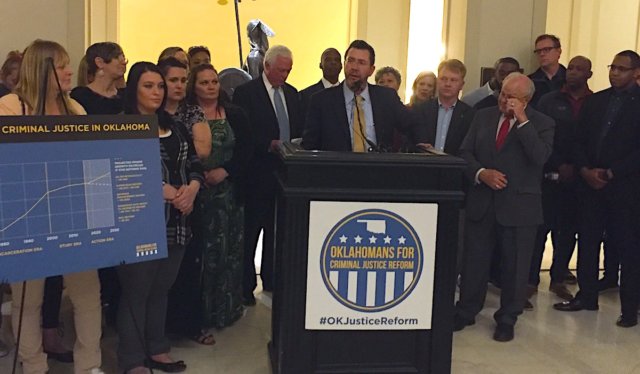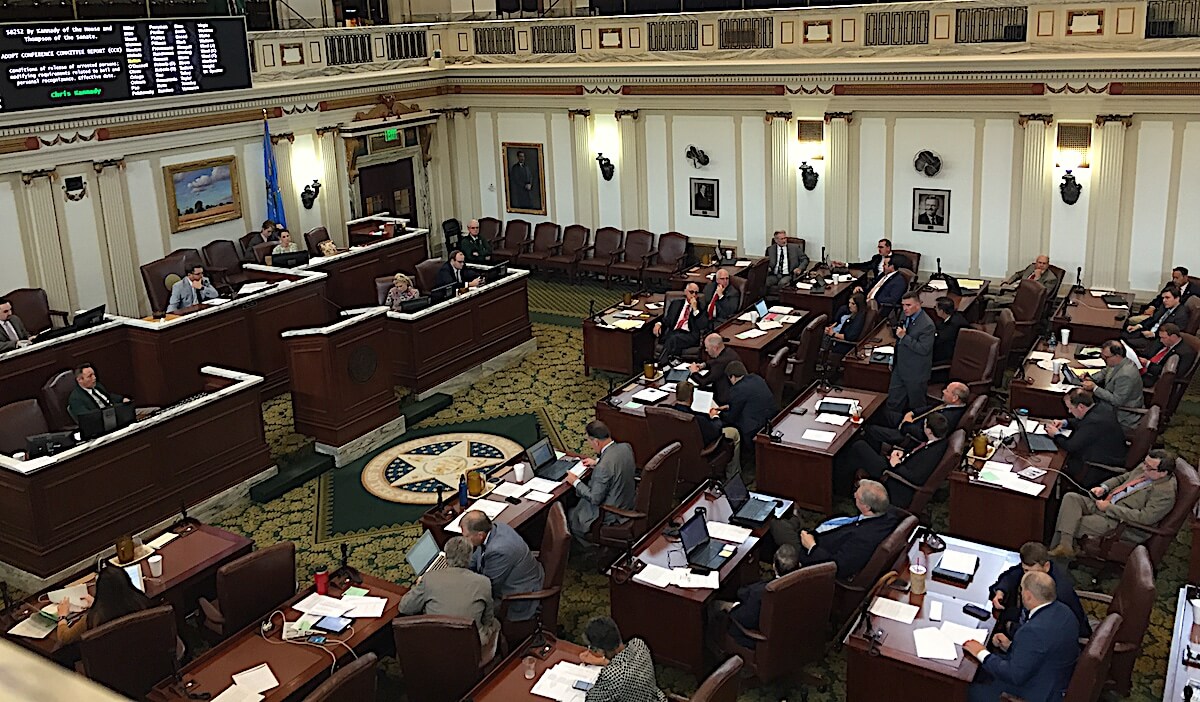
After months wrangling over the details of several criminal justice reform measures, the 2019 Oklahoma Legislature adjourned sine die after passing a retroactivity measure but punting on other bills pushed by advocates.
“We are very thankful, grateful that the reforms that the voters passed in 2016 in the form of State Question 780 have been applied retroactively to those who committed an offense for simple possession before July 1, 2017, it looks like that is going to impact about 500 families,” said Kris Steele, executive director for Oklahomans for Criminal Justice Reform. “The sad reality is, even with the passage of HB 1269, our prison population is going to continue to grow, and Oklahoma will continue to be the world leader in incarceration.”
Once signed by Gov. Kevin Stitt, HB 1269 (embedded below) will apply State Question 780’s reforms retroactively to certain incarcerated men and women. The final language directs the Oklahoma Pardon and Parole Board to implement a specialized commutation docket for addressing retroactive sentencing for individuals.
“I’m proud to be a part of a bipartisan bill that affects so many Oklahomans,” said House Majority Floor Leader Jon Echols (R-OKC). This is a huge step in criminal justice reform and the expungement portion of the bill could help literally tens of thousands of Oklahomans.”
A co-author with Echols on HB 1269, Rep. Jason Dunnington (D-OKC) agreed.
“Criminal justice reform is something that the citizens of Oklahoma have asked us to accomplish. HB 1269 was an important first step in that direction,” Dunnington said. “While the work is far from done, there will be hundreds of Oklahomans reunited with their families and back to work before the holidays.”
Steele: ‘We didn’t take near enough action’
Steele, on the other hand, had less optimism in the face of his group’s other favored proposals stalling out at the end of session.
“In a session that was so promising and when the governor himself ran on a criminal justice reform platform and wants to be a governor of action and begin the process of reducing our prison population by 20 percent and moving us out of this dubious distinction of being No. 1, we didn’t take near enough action this year to accomplish those goals.”
Steele and his group have argued that criminal justice reform issues have been studied enough.
RELATED
SB 252 bail reform bill fails in Oklahoma House by Tres Savage
“Instead, it appears he has opted to kick the can down the road and study the issue yet again. Change is hard. Change is difficult, and when we start talking about significant change, we start talking about groups that are very powerful and very forceful and want to protect the status quo.”
Steele said bail bond companies, district attorneys and other law enforcement entities successfully derailed proposals like bail reform, implementing a clear “possession with intent to distribute” statute and reforming the guidelines for sentence enhancement.
“Nonviolent offenders in Oklahoma on average serve about twice as long a prison sentence as anywhere else in the United States, and there is no evidence that that leads to behavior modification or anything else positive in the life of the person or for the state,” Steele said.
Sen. Kay Floyd (D-OKC) said Thursday that she thought HB 1269’s retroactivity was a “positive step forward,” especially considering how it looked like even that bill was going to flounder earlier in the day. That underscored the political uncertainty of proposed reforms this year.
“Four weeks ago, we thought everything was going to happen,” she said. “I don’t really know how to explain it. I think there were some groups who were not as enthusiastic about criminal justice reform as I think the House and the Senate are.”
She said she personally supported SB 616‘s effort to reform the parole process, though the bill did not receive final consideration despite passing the Senate unanimously in March.
“I’ve been told there was jockeying,” Floyd said. “I thought it was a very, very good bill. I was disappointed it didn’t move forward.”
Senate President Pro Tempore Greg Treat (R-OKC) spoke to media later Thursday afternoon and said SB 616 “would have moved the needle considerably and had an actual bed impact.”
“So I’m disappointed we didn’t get that to the governor’s desk,” Treat said. “We were trying to get movement on that. Unfortunately we could not get that all the way to the finish line, so we wanted to make sure we got some modicum of reform done, and (HB) 1269 was one we could get to the governor’s desk.”
Treat said he still has concerns about HB 1269’s retroactivity plan but that passing it was better than doing nothing.
“DOC’s data is terrible, and we still haven’t improved that yet,” Treat said. “So they’re going to be making some decisions on real human lives to put before the governor and the Pardon and Parole Board for consideration on commutation, and I’m not sure we’re there yet.”
Full text of HB 1269’s retroactivity
 Loading...
Loading...
(Editor’s note: Oklahomans for Criminal Justice Reform purchased advertising on NonDoc in 2019. This story was updated at 11 a.m. Friday, May 24, to include comments from Treat.)





















